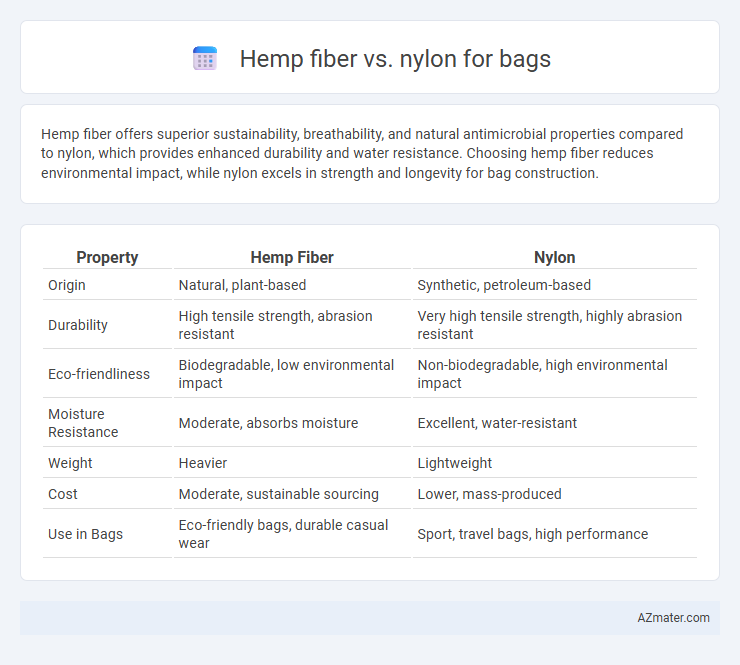Hemp fiber offers superior sustainability, breathability, and natural antimicrobial properties compared to nylon, which provides enhanced durability and water resistance. Choosing hemp fiber reduces environmental impact, while nylon excels in strength and longevity for bag construction.
Table of Comparison
| Property | Hemp Fiber | Nylon |
|---|---|---|
| Origin | Natural, plant-based | Synthetic, petroleum-based |
| Durability | High tensile strength, abrasion resistant | Very high tensile strength, highly abrasion resistant |
| Eco-friendliness | Biodegradable, low environmental impact | Non-biodegradable, high environmental impact |
| Moisture Resistance | Moderate, absorbs moisture | Excellent, water-resistant |
| Weight | Heavier | Lightweight |
| Cost | Moderate, sustainable sourcing | Lower, mass-produced |
| Use in Bags | Eco-friendly bags, durable casual wear | Sport, travel bags, high performance |
Introduction to Hemp Fiber and Nylon
Hemp fiber, derived from the Cannabis sativa plant, is renowned for its durability, breathability, and eco-friendly properties, making it a sustainable alternative for bag manufacturing. Nylon, a synthetic polymer created through petrochemical processes, offers exceptional strength, lightweight characteristics, and resistance to abrasion and moisture, widely used in high-performance bags. Choosing between hemp fiber and nylon depends on priorities such as environmental impact, texture, and longevity in bag materials.
Environmental Impact: Hemp Fiber vs Nylon
Hemp fiber is a highly sustainable material, requiring minimal water, pesticides, and synthetic fertilizers during cultivation, and it is fully biodegradable, significantly reducing environmental pollution compared to nylon. Nylon production relies heavily on petrochemicals, contributing to greenhouse gas emissions and non-renewable resource depletion, with the fabric taking centuries to decompose in landfills. Choosing hemp fiber for bags supports eco-friendly manufacturing practices and helps minimize the carbon footprint associated with synthetic textiles like nylon.
Strength and Durability Comparison
Hemp fiber demonstrates superior tensile strength, with an average breaking strength of 500-900 MPa compared to nylon's 70-90 MPa, making hemp bags highly resistant to wear and tear. The natural fibers of hemp also provide excellent UV resistance and moisture-wicking properties, enhancing durability over time, whereas nylon can degrade under prolonged sun exposure. Hemp's biodegradability combined with its toughness positions it as a sustainable and long-lasting alternative to synthetic nylon for heavy-duty bags.
Water Resistance and Weather Performance
Hemp fiber offers natural water resistance and excellent breathability, making it suitable for bags exposed to moderate moisture and varying weather conditions. Nylon, a synthetic polymer, provides superior water resistance and faster drying times, enhancing durability in heavy rain or humid environments. The weather performance of nylon outperforms hemp in extreme conditions due to its consistent resistance to mold, mildew, and UV degradation.
Weight and Comfort for Everyday Use
Hemp fiber offers a lightweight and breathable option for everyday bags, providing natural moisture-wicking properties that enhance comfort during prolonged use. Nylon, though heavier than hemp, delivers superior durability and water resistance, making it suitable for rugged daily activities. For weight-conscious users prioritizing comfort, hemp fiber is ideal, while nylon excels in strength and weather protection.
Aesthetic Appeal and Versatility
Hemp fiber offers a natural, rustic aesthetic with earth tones and a textured feel, making bags visually unique and eco-friendly. Nylon provides a sleek, polished appearance with vibrant color options and smooth finish, enhancing versatility for both casual and professional settings. Hemp fibers excel in breathability and aging gracefully, while nylon boasts superior water resistance and durability for diverse uses.
Cost and Market Availability
Hemp fiber offers a cost-effective and eco-friendly alternative to nylon for bags, with raw material expenses generally lower due to sustainable cultivation and less intensive processing. Nylon dominates market availability, benefiting from mass production and extensive distribution networks, making it more accessible and varied in styles. The initial investment in hemp materials can be higher in specialized markets, but rising demand for sustainable products is gradually increasing its presence and reducing costs.
Maintenance and Longevity
Hemp fiber bags offer exceptional durability and resistance to wear, requiring minimal maintenance due to their natural mildew and UV resistance. Nylon bags, while lightweight and water-resistant, may degrade faster with heavy use and need more frequent cleaning to prevent odor and abrasion damage. Overall, hemp fibers provide longer-lasting strength with eco-friendly benefits, making them ideal for long-term bag use.
Sustainability and Eco-Friendliness
Hemp fiber outperforms nylon in sustainability due to its renewable growth cycle, minimal pesticide requirement, and biodegradability, significantly reducing environmental impact compared to petroleum-based nylon. Hemp cultivation improves soil health through phytoremediation and promotes carbon sequestration, which supports eco-friendly production practices in the bag industry. Conversely, nylon's manufacturing process involves high energy consumption and releases greenhouse gases, making hemp a superior eco-conscious choice for sustainable bags.
Choosing the Right Material for Your Bag
Hemp fiber offers exceptional durability, breathability, and eco-friendliness, making it ideal for sustainable and lightweight bags. Nylon provides superior water resistance, flexibility, and strength, suited for heavy-duty or weather-resistant bags. Consider usage needs, environmental impact, and maintenance preferences when choosing between hemp fiber and nylon for your bag.

Infographic: Hemp fiber vs Nylon for Bag
 azmater.com
azmater.com